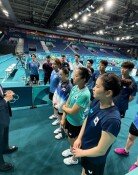[Opinion] Is It Enough Simply to Separate Party Power and the Presidency?
[Opinion] Is It Enough Simply to Separate Party Power and the Presidency?
Posted January. 28, 2002 09:29,
Whenever we criticized our authoritarian President as being a `Imperial President` the administration always protested. But the administration has since admitted its own failure and announced to separate party power from presidential power as the upcoming Presidential elections draw near. The rationale is that this separation will solve the problem of an authoritarian presidency. When the ruling party began show this attitude, the opposition party started to take a similar stance. It appears that everyone has acknowledged that our nation`s president is not a democratic one but an authoritarian one.
The question is, however, whether the separation between party power and the presidency will actually solve the problem of authoritarian politics and executive structure. Many things are implied in the announcement of this separation. First of all, the announcement is an acknowledgement that the constitutional branch of the presidency has posed a serious obstacle to national and political advancement by controlling the ruling party, and that the ruling party has consequently exercised considerable power in running the country when it is not even a government branch.
In the Constitution, the National Assembly, the administration, and the judiciary branch are clearly separated according to the principle of separation of powers and mutually check one another`s power. If, however, in spite of this principle, the president has ruled over the government like a despot, it is proved that he contradicts the people`s Constitution and that there is a primary factor that makes possible such primitive authoritarianism. What made a mockery of the National Assembly and chained its representatives to the president or the party instead of representing their constituency, and allowed the president to control the nation like some dictatorship? When the president has so much power, his mistakes become the people`s suffering. Our citizens are feeling this in their bones.
The biggest problem that has led to such concentration of power despite constitutional separation of powers is the Korean ruling party. This feudalistic mob-like organization or faction has incapacitated the National Assembly and denigrated the members from being the representatives of the people to the president`s subordinates. As the boss of this ruling party and the regional leader, the president has used his weapons of regionalism and nominating power to turn the Assembly members into his subordinates, and the leader of the opposition party has done likewise using the same system. This is why authoritarian politics remain regardless of the change of power between ruling and opposition parties.
Inasmuch as the National Assembly has become powerless due to the despotic executive and factional ruling party, and insofar as its members have become the president`s servants and cannot properly maintain the checks and balances of power, our number one priority is to normalize the National Assembly. In order to do this, the ruling party must undergo reform. When the central party system`s nucleus that is the cause of the disease is abolished, assemblymen can work as the people`s representatives and the severe problems in governmental subsidies and political financing can be solved. Political corruption, too, will naturally decrease. Representatives can carry out party-related activities through small groups inside the Assembly which will normalize it and elevate its status. There will not be any need for a political boss. The representatives only need to serve the people.
The reason why the president does not become the boss of the ruling party is because he absolutely must not in order to have a nonpartisan government. It is the consequence of the separation between party power and the presidency. Furthermore, the ruling party cannot but be the principal target of Korean political reform.
Yet, this separation of party and presidential power would do nothing except stop the president from monopolizing the party while the huge stumbling block that the ruling party is will go on existing and various elements compete with one another to take power. As long as the mob politics of the ruling party subsist and another party boss emerges to create power struggles, the Korean assembly members will unavoidably become the boss` servants and the Assembly itself will become a playground for political mobs rather than the gathering place of democratically elected representatives.
Hence, the part-president separation idea will maintain the contradictory structure of the ruling party, cannot be a strategy for greater democratization, and amounts to nothing more than a power struggle that pervades the political landscape. The first step in overcoming a despotic presidency is normalizing the Natioanl Assembly and overhauling the pre-modern ruling party structure. To promote a separation of party and presidency as if it would eliminate authoritarian politics altogether while allowing the fundamental problem to go on existing is to fabricate more fantasies and deceive the people.
Chung Jong-Seop (Seoul National University, Professor of Constitutional Law)







